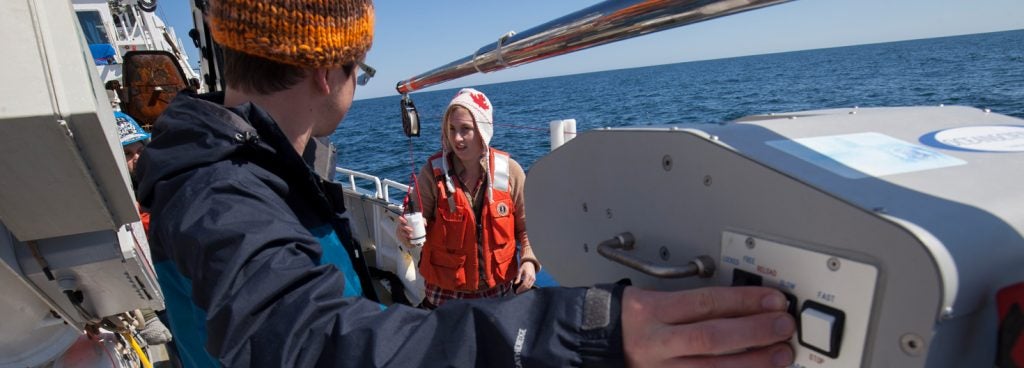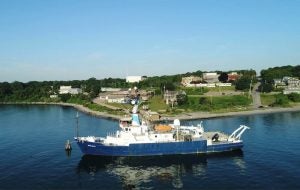 Despite its name, our renowned Graduate School of Oceanography (GSO) isn’t just for graduate students. Undergraduates can take courses, assist with research projects and even go to sea aboard URI’s research vessel, the Endeavor.
Despite its name, our renowned Graduate School of Oceanography (GSO) isn’t just for graduate students. Undergraduates can take courses, assist with research projects and even go to sea aboard URI’s research vessel, the Endeavor.
For instance, Assistant Professor Melissa Omand taught an undergraduate honors class last spring that she called CSI: Ocean, which combined studies of marine science with science communication and included a six-day trip aboard the 185-foot Endeavor. The class cruised to hot spots of marine life about 100 miles south of Rhode Island where they used various state-of-the-art technologies to examine the relationship between the ocean’s physical dynamics — eddies, currents and fronts — and a wide variety of marine creatures, from plankton to whales.
Senior Ellis Iacono called the class and cruise “easily the most enriching experience in my undergraduate career.” The biological sciences and journalism major added that his favorite part was “the almost immediate camaraderie that blossomed between classmates, professors and the Endeavor’s crew.”
Karla Haiat agreed. A junior double-major in ocean engineering and marine biology, she appreciated how the whole group worked together to make the cruise a success. “We all got really close, which improved our ability to work as a group,” she said. “I really enjoyed learning from different people, including the engineers and technicians.”

In addition to the scientific research, the students created videos and participated in live events hosted through the Inner Space Center that were broadcast online to a global audience. Iacono even served as the anchorman for the broadcasts.
“I was the host for our live segments in which I interviewed fellow students in an effort to explain to viewers the purpose of our time on the Endeavor,” he explained. “I learned a lot about how science is effectively communicated through the media, and how complicated research must be translated in a way that is viewer-friendly and easy to synthesize without losing any of the complexity of the research projects.”
Not everything went according to plan, however, which is somewhat typical of complex scientific investigations at sea. “The most valuable thing I learned from my experience was the importance of improvisation and creativity when it comes to fixing problems,” Haiat said. ”I really look up to our professor because of her capacity to try things that no one has ever tried to get a unique perspective on a problem.”
For marine biology major Dan Achilles, who had also joined a research cruise to Antarctica during winter break last January, the experiences he has enjoyed through the Graduate School of Oceanography have helped him decide on his future career path.
“Ever since my first research cruise, I’ve had a strong interest in oceanographic science,” he said. “This class introduced me to new topics in the field and helped deepen my interest further. It will likely push me toward pursuing a graduate degree in the field of oceanography.”
